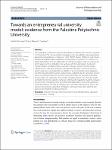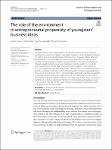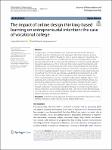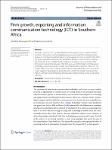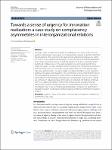Search
Author
- Osman, Ahmed I. (5)
- Daqing, Ma (3)
- Jorgensen, Ed (3)
- Li, Yan (3)
- next >
Subject
- kinh tế (26)
- Economics (12)
- programming (10)
- XRD (10)
- next >
Date issued
- 2020 - 2025 (2128)
- 2010 - 2019 (129)
- 2000 - 2009 (9)
- 1999 - 1999 (1)
Has File(s)
Search Results
Sluggish market demand can deteriorate the financial situation of a company and affect a shareholder’s decision to adopt environmental, social, and governance criteria (ESG). According to the socioemotional wealth theory, family firms place significant emphasis on sustainable development and long-term orientation, but this emphasis can be either internally or externally driven according to the type of involvement chosen by the owning family. Therefore, this study uses listed family firms to explore the relationship between different types of family involvement (i.e., family ownership and control, the influence of market competition, and the institutionalisation level of the environment in which a firm decides to pursue ESG criteria). We performed a multivariate regression analysis o... |
Internal whistleblowing systems are supposed to fight misconduct within organizations. Because it is difficult to study their efficacy in the field, scientific evidence on their performance is rare. This is problematic, because these systems bind substantial resources and might generate the erroneous impression of compliance in a company in which misconduct is prevalent. We therefore suggest a versatilely extendable experimental workhorse that allows the systematic study of internal whistleblowing systems in the lab. As a first step, we tested the efficacy of whistleblowing systems if internal punishment for misconduct is mild and hesitant which is usually the case in practice, as several fraud surveys confirm. Our results show that under these conditions almost nobody blew the whis... |
The interest in greenwashing has grown in recent decades. However, comprehensive, and systematic research concentrating on the evolution of this phenomenon, specifically regarding its impacts on stakeholders, is still needed. The main purpose of this study is to provide an overview and synthesis of the existing body of knowledge on greenwashing, through a bibliometric study of articles published up to 2021, identifying the most relevant research in this field. Special attention is given to the latest articles that link greenwashing to stakeholders, identifying gaps and future research opportunities. A bibliometric analysis and literature review was performed on 310 documents obtained from the Web of Science database, using the VOSviewer software program. This article identifies the ... |
This study aims to introduce a proposed model for transforming the Palestine Polytechnic University (PPU) into an entrepreneurial university. Towards that end, a quantitative approach using statistical techniques of t test, ANOVA, Kruskal–Wallis test, and Pairwise comparisons supported by explanatory and qualitative discussions were utilized. The main findings show that the applicability of entrepreneurship at PPU was relatively fair for the aspects of the compatibility of curricula with the labor market needs, community relations and partnerships, academic exchange, entrepreneurship culture, entrepreneurial education, and university internationalization. Entrepreneurship as a policy objective was moderately acceptable for university policies and regulations, scientific research and... |
Entrepreneurship shows regional differences through countries’ history, economic environments, society and habits of individuals. Youngsters can think globally and have the highest skills to access information and know-how. This paper collects data from students’ project work from different countries and extract that information, which can give interesting input to describe regional effects on entrepreneurial propensity through a quantified semantic analysis. Youngsters from 12 countries received the same instructions to present their national economies and then create a business there. The fundamental question of the paper is that are there any definable attributes from the economic environment, which effect youngsters’ entrepreneurial propensity? How can we describe these effects?... |
Entrepreneurial intention is fundamental to decision-making and the behaviors needed to become entrepreneurs, with subsequent effects on economic development. However, the COVID-19 pandemic calls for a novel approach to teaching entrepreneurship owing to the shift to online learning. The current study explores entrepreneurial intention and the satisfaction derived from the entrepreneurship education program. In particular, we offer a framework that explains students’ satisfaction and entrepreneurial intention by integrating the theory of planned behavior with design thinking-based entrepreneurship courses, peer interactions, and speaker interactions. The entrepreneurship education program was for vocational college students located in Southeast Asia. |
This paper examines the key determinants of firm growth in three Southern African countries of Eswatini, Lesotho and Namibia and assesses whether exporting activity and use of information communication technology play any role in growth of the firms. The paper uses data collected by the World Bank through enterprise surveys during the period 2014–2016. Employing the ordinary least squares, the results show that firm growth is determined by size of the firm, age, use of information communication technology, exporting activities, foreign ownership and the legal form of the firm. The result is robust even when controlling for industry and country differences. Overall, the results support industrial policy geared towards small firms through rolling out information communication technolo... |
This paper seeks to explore the concept of complacency as a barrier to the sense of urgency within product innovation, by investigating the concept on behalf of interfirm project partners. More specifically, the study aims to understand complacency within the context of an industrial research project in Norway subject to material substitution of an energy transmission tower. As such, the study seeks to give a contextual understanding of complacency for innovation realization (e.g., innovation speed) from a single case study. The study identified different complacency mechanism asymmetries on behalf of the actors, as well as the varying reasons (drivers) to why urgency gaps may occur among actors. |
European Community (EC) Horizon-funded projects and Earth Observation-based Consortia aim to create sustainable value for Space, Land, and Oceans. They typically focus on addressing Sustainable Development Goals (SDGs). Many of these projects (e.g. Commercialization and Innovation Actions) have an ambitious challenge to ensure that partners share core competencies to simultaneously achieve technological and commercial success and sustainability after the end of the EC funds. To achieve this ambitious challenge, Horizon projects must have a proper governance model and a systematized process that can manage the existing paradoxical tensions involving numerous European partners and their respective agendas and stakeholders. |
Because mandatory disclosure of intellectual capital (IC) is restricted by accounting regulations, companies invest in voluntary IC disclosure (ICD) to reduce information asymmetries and support an adequate firm valuation by investors and other stakeholders. So far numerous studies analysing the value relevance of voluntary ICD have been published revealing mixed results. Thus, it is the purpose of this paper to statistically integrate and to explain the heterogeneity of results by applying a meta-analysis with 122 effects of 40 primary studies. Our results mainly support the value relevance of voluntary ICD resulting in higher market value, lower cost of equity, and higher accounting performance. We identify weak moderating effects for legal origin, different IC categories and jour... |




